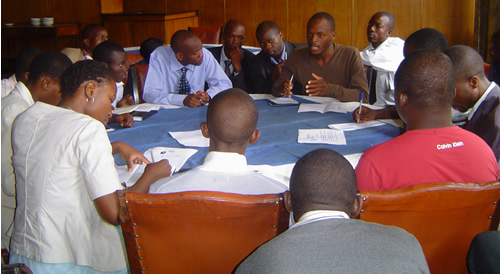Got to confess to more confusion now. Short-term gain vs. long-term disaster is dumb, but makes a wee bit of sense. But this!
Last week someone from the accommodations at Avondale Police station drove into our Durawall. It was about 0300 in the morning but he woke someone up. It was a Toyota Prada, and the driver parked, got out, and walked into the accommodation area with a beer bottle in his hand. One section of our wall panels is destroyed. An initial report was made at Avondale Traffic – RRB 1331739, to a Sergeant, and next morning a couple of us went across to get the full story – TAB 228/12.
The full story we got was that we were making allegations that he was a policeman, or known to the police, and allegations that he was drunk. And why did we not get the licence plate number?
All well and good, these were allegations. We did not KNOW anything (except the wall was destroyed)!
So, we are back again the next day to see the right person, and the day after that, and finally we discover that an admission of guilt has been signed and a fine paid. “But, we want our wall fixed.” Come back and we will give you the papers on the alleged culprit, and your insurance company can sue his insurance company and and, and, …
Immediately I have to make a correction. “If he has signed an admission of guilt, it is no longer an allegation.” He has committed a crime.
Ah yes, well, come back …
And in the meantime, while watching the hole in our wall, we discover that a load of Durawall panels has been dropped off and it looks like the wall will be fixed. Which is fine. We have what we want. Our short-term gain is fulfilled.
But the criminal who broke our wall? (Allegedly a drunken policeman). There was definitely a conspiracy on the part of the police to cover up for him. First, they were not sure they could locate, or even identify whoever it might be. Then, we were making allegations against the police! Then, he was found, but even after signing an admission of guilt, he was still an ‘alleged’ criminal. And to date, no name has ever been given to us. However, he has a criminal record. He paid a fine. He is fixing the wall. What short-term gain did he get?
As for long-term disaster?
The police have serious mud on their faces. Smeared all over. They stink. And for what gain? First, they have not managed to harbour any fugitive, he was still caught and he has still paid for breaking the law. And now they, the whole Zimbabwe Republic Police (ZRP), are seen as an organisation that attempts to cover for criminals. The whole block of flats now believes the police are not to be trusted. Not to be given information. Not to be drawn into any activity. So even the good ones (and there are many) are seen as being less than ‘real men’. Less than decent humans.
After all, what would be the decent, human, ‘real man’, thing to do? It is an accident, a mistake, an error. And what does a decent human do when they make a mistake? They confess to it, and apologise. Go next door and say, “Sorry I broke your wall. I was drunk, it was a mistake, so sorry. I will fix it.” You have nothing to gain by not doing that. You still have your criminal record, you still have paid your fine, and you still have to fix the wall. So why not do it nicely?
Why drag the entire police force into it, and make them complicit, in your drunken mistake? You have gained nothing by doing it all underhand. You have only lost your credibility. And lost a good deal of credibility for the entire ZRP.
So, destroying your long-term future for short-term gain (like shooting all the rhinos to make money now, and making them extinct) may be more than just a little bit silly. But there is at least a short-term gain. It does make some, immediate, sense. But pissing away your long-term future for no immediate gain is just, well … not a course of action I would recommend.
It is sheer stupidity.










